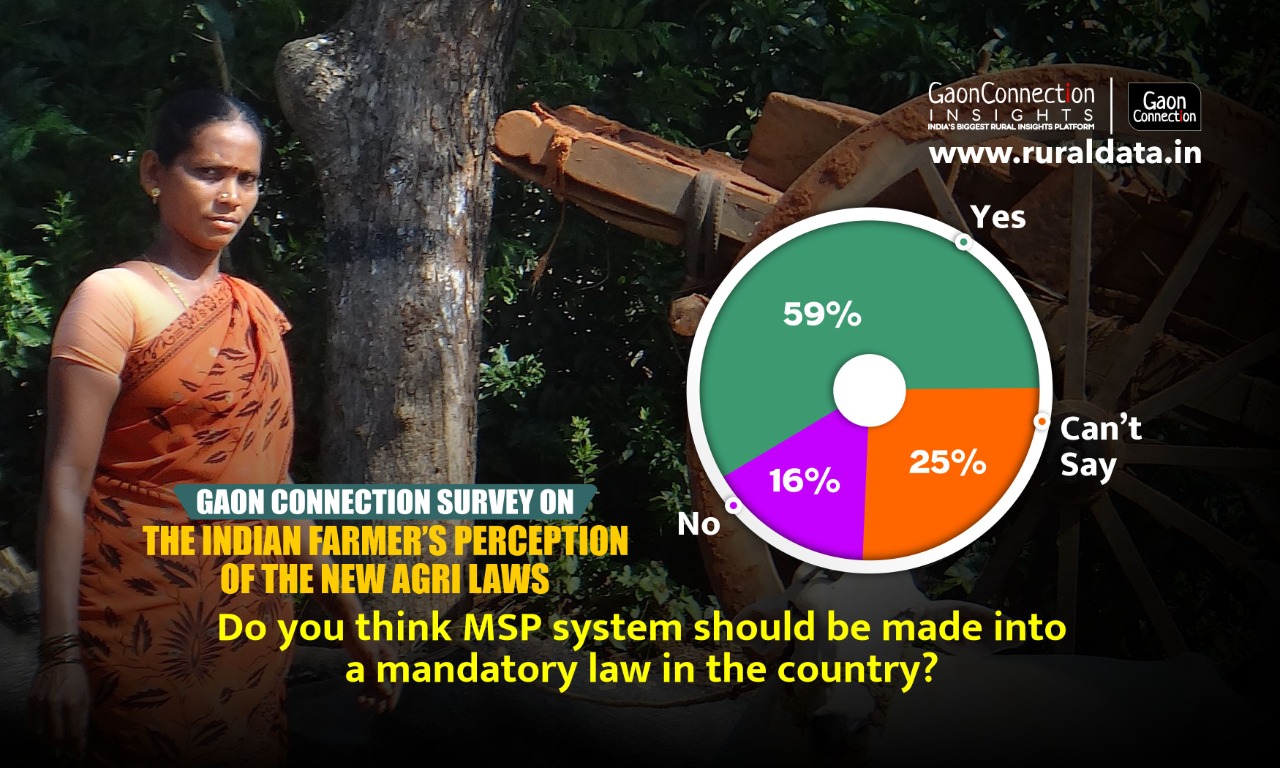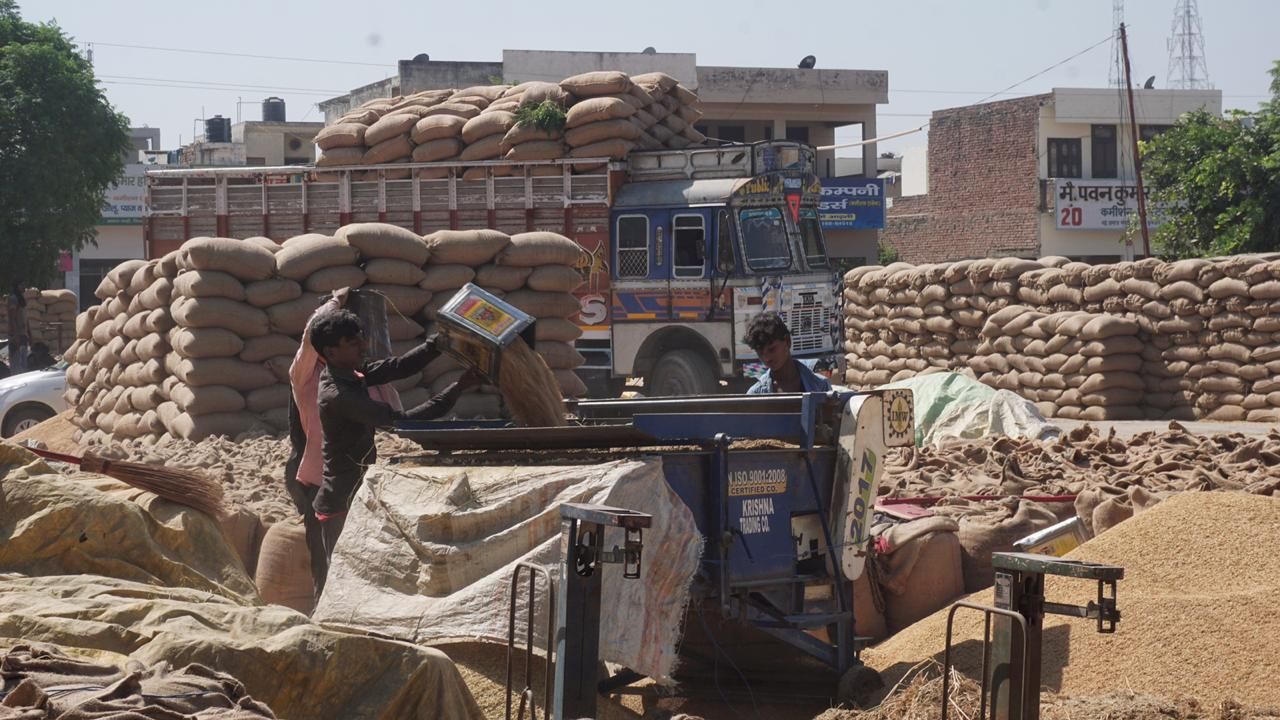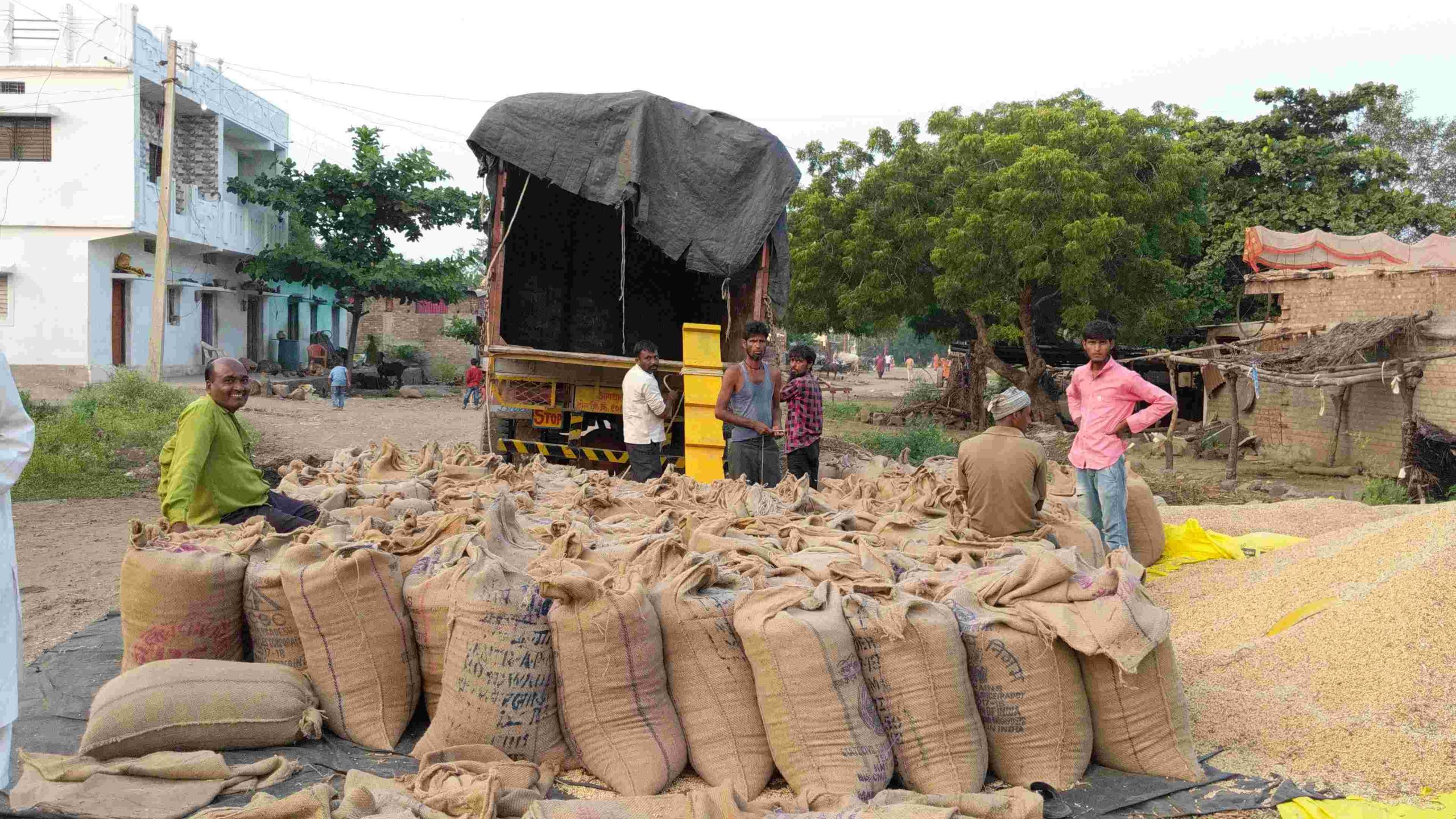Paddy Loot: Punjab Police confiscates illegally smuggled paddy into the state
Traders and middlemen procure paddy at low rates from farmers in Uttar Pradesh and Bihar, then make a killing, selling it at a huge profit in Punjab, leaving both farmers and the exchequer at a loss.


The Punjab Police has recently confiscated 11,080 quintals of paddy at the Punjab-Haryana border in Patiala. Photo: By arrangement
Fifty three trucks with 1,108 tonnes (11,080 quintals) of paddy from parts of Uttar Pradesh, Bihar and Haryana, snaking their way into Punjab were recently stopped at Patiala’s Ghanaur block, by the police. They were entering into the state from Lucknow, Barabanki, Patna and other places at the Punjab-Haryana border in the Shambu area of Patiala district.
“Trucks were intercepted, the paddy was confiscated, and their drivers and helpers were taken into custody. Elsewhere, another seven trucks were taken into custody at other border points in Patiala district, including Pehowa, Balbera, Cheeka, Dhabbi Gujran and Patran,” Gurmeet Singh, inspector and station house officer of the police station in Patiala’s Ghanaur block told Gaon Connection.
According to police sources, so far 50 FIRs have been registered in different places in Patiala under section 420 (cheating) and 120-B (criminal conspiracy) of the Indian Penal Code.
Meanwhile, in Amritsar, farmers’ associations stopped 26 paddy-laden trucks in the past three days. Later, these trucks were seized by the local authorities. “The matter is currently under probe by the mandi board as well as police authorities,” informed Jasjit Kaur, Amritsar district food and supplies officer.
“Trucks have also been intercepted in other border districts of the state, including Sangrur and Bathinda,” Munish Narula, deputy director, Punjab Food and Supplies department, informed Gaon Connection. His department is helping the Punjab Police probe the matter.

Preliminary investigation into the paddy-bust has revealed that the confiscated produce was bought from farmers in Uttar Pradesh and Bihar for anything between Rs 900 and Rs 1,100 per quintal. “The intention was to sell it in Punjab at the full MSP [minimum support price] of eighteen hundred and eighty eight rupees per quintal,” Vikramjeet Singh Duggal, senior superintendent of police, Patiala told the media adding that this would have caused much loss to the farmers. The Government of India procures a huge percentage of paddy from Punjab.
Incidentally, this is not the first year that paddy has been smuggled into the state from elsewhere. “We registered similar FIRs last year too, but we never had a confiscation of such a huge quantity of paddy as seen this time,” inspector Gurmeet Singh admitted.
According to Jagmohan Singh, general secretary of Bhartiya Kisan Union-Dhakunda, in the last three-four years, state procurement agencies often purchased 10-15 per cent more paddy than the state’s overall total paddy production. “Because there is no organised mandi system in Uttar Pradesh and Bihar (in Bihar the Agricultural Produce Market Committee system was abolished in 2006), and the MSP-based procurement system is negligible, farmers there are compelled to sell their produce to traders and middlemen who in turn transport it to states like Punjab and earn huge profits in the bargain, taking advantage of the strong MSP based procurement system in the state,” he explained to Gaon Connection.
Gaon Connection Survey
The past few months have seen large scale unrest amongst the farming community across the country, especially in the northwest region, over the three new agri-acts. Among other things, the farmers feared that the mandi/Agricultural Produce Market Committee (APMC) systems would be done away with, and along with that would end the MSP, leaving them vulnerable to the whims of the outside traders.
A recent rapid survey by Gaon Connection only reconfirmed these fears. The survey covered 5,022 farmers across 53 districts in 16 states, to understand their apprehensions and reservations about the three new agri-laws. It emerged that 39 per cent of the respondent farmers believed that the new laws would usher in the end of MSP; and more than half of the surveyed farmers, (59 per cent) wanted a law that would make MSP legally binding.

The rapid survey findings also revealed that the lowest proportion of farmers selling agricultural produce at MSP was in the region covering Uttar Pradesh, Bihar and Uttarakhand (26 per cent). The results of the survey are released as the ‘The Rural Report 2: The Indian Farmer’s Perception of the New Agri Laws’ .
The paddy bust seems to confirm the worst fears of the protesting farmers. The harvesting of the kharif crops is almost done and farmers are in a hurry to sell their produce and start preparing for the next crop of rabi season. They can’t do that till they sell their harvest, pay labourers, settle debts and prepare for the next sowing. Making the most of the situation, middlemen, commission agents and traders are compelling the farmers in states like Bihar and Uttar Pradesh to sell paddy to them at prices much below the government-fixed MSP of Rs 1,888 per quintal.
It is this paddy, bought at such low rates from the farmers there, that was being illegally transported to Punjab. The intention was to sell them at full MSP to earn huge profits, said the police that has been intercepting these trucks on interstate routes, trying to enter the state through various points, since October 16.
According to inspector Gurmeet Singh, while they have arrested the drivers and helpers in Patiala, it is obvious the masterminds are sitting elsewhere. “This racket can’t be run without involvement of traders, commission agents and millers from Punjab, Uttar Pradesh and Bihar,” he stated. Based on the transport documents, the police is trying to identify these people.
“In Punjab, payment to the farmers is made through licensed arthiyas (commission agents), who could very easily mix paddy purchased from outside the state in the produce of local farmers and then sell it to them to the government,” Gurmeet Singh, secretary, area market committee, Ghanaur, reiterated.
The food and supplies department and the Punjab mandi board that runs notified area market committees (where sale and purchase of farmer produce is done) have also been taken on board to identify those behind the operations.
So far, two rice millers in Patiala district have been issued show cause notices based on the transport documents provided by the police, Harsharan Jeet Singh, food and supplies officer, Patiala, told Gaon Connection. “If their role is found dubious, we will cancel their milling license,” he said. He added that their mandi inspectors are quite vigilant at the time of buying, but checking and monitoring the inter-state borders were the best way to stop this practice.

More than meets the eye
Gaon Connection has obtained paddy production and paddy procurement data from government agencies, which shows how paddy purchased in Punjab is more than its production.
As per the data of the Food Corporation of India (FCI), and the government agencies, both state as well as centre, procured 163.82 lakh tonnes of paddy from Punjab in 2019-20, whereas according to data obtained from the state agriculture department the total production of paddy in the state that year was 150.4 lakh tonnes. Thus, the state procured nine per cent more than its total paddy production in 2019-20.
Similarly in 2018-19, while the government procured paddy at 170.46 lakh tonnes, the paddy production in the state was 169.29 lakh tonnes. The year before in 2017-18, the procurement was 179.56 lakh tonnes while the production was only 174.14 lakh tonnes.
The Punjab Police has recently confiscated 11,080 quintals of paddy. Even had the middlemen procured the confiscated paddy at Rs 1,000 a quintal from the farmers in Bihar and Uttar Pradesh, and had managed to sell it at the MSP of Rs 1,888 a quintal in Punjab, this would have meant a loss of nearly a crore (Rs 98,39,040) to the farmers and the exchequer.
When contacted, Sumeet Bansal, FCI’s deputy general manager (procurement) in Chandigarh told Gaon Connection that the state government is best equipped to handle any irregularities in procurement since a major chunk of paddy purchase is under state procurement agencies.
Farmers organisations claim that the irregularities are more visible this year because they have been putting pressure on the authorities to act on the matter. “Our members are at the forefront in intercepting these trucks at several places and they are not releasing them until police are registering criminal cases. But still, not all inter-state borders are properly sealed despite assurance from the state government,” Jagmohan feared. These incidents proved that an open market economy was not in the best interest of the farmers. On the contrary it would plunge them into extreme fiscal distress, he felt.

Strengthen MSP-based procurement
“The very fact that paddy from Uttar Pradesh and Bihar is being illegally transported to Punjab gives a clear picture that farmers there are not getting MSP for their produce,” RS Ghuman, professor of economics at Chandigarh based Centre for Research in Rural and Industrial Development told Gaon Connection. “Imagine what will happen if MSP and APMCs are made redundant under the new farm laws. It will hit the farmers even more and benefit the traders and the corporates,” he said.
According to him, if private players want to procure, they should do so at notified market committees rather than outside it where there is no financial security to the farmers.
The fear is that the new agri-laws will make Punjab farmers open to exploitation too as it has happened in Uttar Pradesh and Bihar, which have weak or nonexistent APMC and MSP systems. “It will force our farmers here to sell their produce at cheap rates as it is happening in Uttar Pradesh and Bihar where MSP based purchase is minimal,” Sukhdev Kokri, general secretary of BKU-Ugrahan which is spearheading the farmers’ protest in Punjab, told Gaon Connection. “That is the reason, we are determined not to let these new farm laws come into force here as it will ruin the farmers especially the small and marginal ones who are already in financial distress, ” he said.
Jaswinder Singh Brar, professor of economics at Punjabi University, Patiala, echoed Kokri’s concerns. “Agriculture trade can’t be left at the mercy of market forces. The basic principle on which traders work is to buy goods at less rates and sell it at higher rates to earn profit. They understand no other business language,” he told Gaon Connection. “I fear if traders get more freedom in the agriculture sector as these new acts ensure, the farmers’ income will be drastically affected,” he said.

